
 |
||||||
|
GAY
FILM REVIEWS BY MICHAEL D. KLEMM
|
||||||
|
Bruno Universal
Home Entertainment, Director: Screenplay: Starring:
Rated R, 82 minutes |
The
Austrian Queen
What's a politically correct queer to do? On the one hand, Sacha Baron Cohen's 2009 Bruno is a one-joke movie of very questionable taste starring an annoying stereotype. On the other hand, I almost lost bladder control a few times from laughing so hard. |
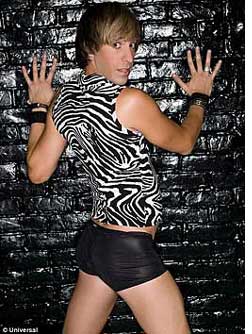 Unless
you somehow missed the media saturation, you already know that Bruno is
flamboyantly, outrageously, in-your-face Euro-gay. His hair is peroxide
blonde, his body is waxed, his wardrobe a hybrid of Boy George and Versace.
Cohen originally created his Bruno persona on Da Ali G Show, first
aired on Britain's edgy Channel 4 (which also brought us My
Beautiful Laundrette and the original Queer
As Folk) and then on HBO. Cohen's characters, which also include
Borat, were unorthodox (to say the least) journalists who conducted asinine,
and often offensive, interviews with unsuspecting guests. His marks were
celebrities and public figures whom he often publicly embarrassed with his
leading questions. Cohen's sketches are often vulgar but come with an agenda
that exposes institutionalized bigotry and hypocrisy. Borat, for example,
was an anti-Semite from Kazakhstan - put him in a room with a few white
supremacists and who needs a laugh track? Reality can sometimes be blurred
because the audience isn't always sure when the participants are in on the
joke and when the wool is really being pulled over their eyes. Unless
you somehow missed the media saturation, you already know that Bruno is
flamboyantly, outrageously, in-your-face Euro-gay. His hair is peroxide
blonde, his body is waxed, his wardrobe a hybrid of Boy George and Versace.
Cohen originally created his Bruno persona on Da Ali G Show, first
aired on Britain's edgy Channel 4 (which also brought us My
Beautiful Laundrette and the original Queer
As Folk) and then on HBO. Cohen's characters, which also include
Borat, were unorthodox (to say the least) journalists who conducted asinine,
and often offensive, interviews with unsuspecting guests. His marks were
celebrities and public figures whom he often publicly embarrassed with his
leading questions. Cohen's sketches are often vulgar but come with an agenda
that exposes institutionalized bigotry and hypocrisy. Borat, for example,
was an anti-Semite from Kazakhstan - put him in a room with a few white
supremacists and who needs a laugh track? Reality can sometimes be blurred
because the audience isn't always sure when the participants are in on the
joke and when the wool is really being pulled over their eyes. |
|
|
|
|
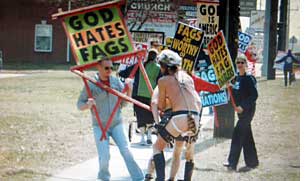 The
rest of the movie is basically a series of sketches strung together, most
of them designed to induce extreme discomfort from homophobes when confronted
with the Austrian uber-fag. It's easy to get laughs when you throw Bruno
into a campfire scene with a group of redneck hunters and then have him
talk about Sex In The City. Hilarity is certain when an almost naked
Bruno and Lutz, handcuffed and harnessed together, stumble through a protest
by the Rev. Fred Phelps' Westboro Baptist Church (complete with their "God
Hates Fags" signs). Some of this is very funny, some of it is really stupid,
some of it is offensive. And some of it, unintentionally, probably reinforces
the very stereotypes it aims to skewer. The
rest of the movie is basically a series of sketches strung together, most
of them designed to induce extreme discomfort from homophobes when confronted
with the Austrian uber-fag. It's easy to get laughs when you throw Bruno
into a campfire scene with a group of redneck hunters and then have him
talk about Sex In The City. Hilarity is certain when an almost naked
Bruno and Lutz, handcuffed and harnessed together, stumble through a protest
by the Rev. Fred Phelps' Westboro Baptist Church (complete with their "God
Hates Fags" signs). Some of this is very funny, some of it is really stupid,
some of it is offensive. And some of it, unintentionally, probably reinforces
the very stereotypes it aims to skewer. |
|
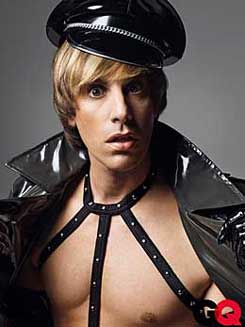 Watching
Bruno is a little like watching
South Park. Sometimes the satire is so dead-on and sometimes
you are unable to wrap your brain around the concept that an adult actually
wrote this. Other times you're still laughing in spite of yourself just
from the sheer shock value. How else can one react when Bruno is interviewing
Paula Abdul, while sitting on Mexican gardeners because the furniture hasn't
arrived, and sushi is served on the torso of an overweight naked man? Or
when he speaks to his agent on the telephone while having his anus bleached.
Sometimes I rolled my eyes. Other times I lost it completely, like when
his pilot, A-List Celebrity Max-Out With Bruno, was shown to a very
conservative sample audience. Think back to the reaction of Mel Brooks'
audience watching Springtime For Hitler as the test group is treated
to a segment in which a Z-list celebrity's sonogram is called a "white trash
fetus," and then to the sight of Bruno lewdly dancing and rubbing his package
against the camera lens. The dance number ends with a twirling penis. One
thing I have to say about Cohen is that he isn't afraid to push envelopes. Watching
Bruno is a little like watching
South Park. Sometimes the satire is so dead-on and sometimes
you are unable to wrap your brain around the concept that an adult actually
wrote this. Other times you're still laughing in spite of yourself just
from the sheer shock value. How else can one react when Bruno is interviewing
Paula Abdul, while sitting on Mexican gardeners because the furniture hasn't
arrived, and sushi is served on the torso of an overweight naked man? Or
when he speaks to his agent on the telephone while having his anus bleached.
Sometimes I rolled my eyes. Other times I lost it completely, like when
his pilot, A-List Celebrity Max-Out With Bruno, was shown to a very
conservative sample audience. Think back to the reaction of Mel Brooks'
audience watching Springtime For Hitler as the test group is treated
to a segment in which a Z-list celebrity's sonogram is called a "white trash
fetus," and then to the sight of Bruno lewdly dancing and rubbing his package
against the camera lens. The dance number ends with a twirling penis. One
thing I have to say about Cohen is that he isn't afraid to push envelopes. |
|
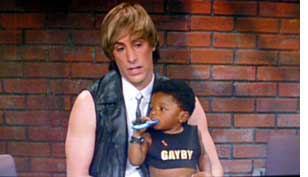 Besides
attacking homophobia, Bruno's
other main target
is celebrity culture. Bruno adopts an African baby (because Madonna and
Brangelina have done it) and gives him a traditional African name: OJ. He
records a sappy all-star "We Are The World" - styled peace and brotherhood
song with the likes of Bono, Sting, Snoop Dogg and Elton John. Bruno adopts
a big cause (George Clooney already has Darfur) and attempts to broker peace
between Israel and Palestine - except that he keeps confusing Hamas with
hummis. When
he wonders why he still isn't famous, he decides to fix it by becoming
a straight macho film star "like Tom
Cruise, John Travolta and Kevin Spacey." No comment. Besides
attacking homophobia, Bruno's
other main target
is celebrity culture. Bruno adopts an African baby (because Madonna and
Brangelina have done it) and gives him a traditional African name: OJ. He
records a sappy all-star "We Are The World" - styled peace and brotherhood
song with the likes of Bono, Sting, Snoop Dogg and Elton John. Bruno adopts
a big cause (George Clooney already has Darfur) and attempts to broker peace
between Israel and Palestine - except that he keeps confusing Hamas with
hummis. When
he wonders why he still isn't famous, he decides to fix it by becoming
a straight macho film star "like Tom
Cruise, John Travolta and Kevin Spacey." No comment. |
|
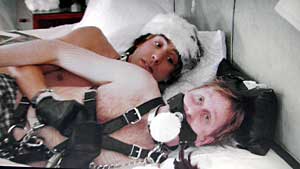 There
are sight gags in this movie that will be etched into your brain forever.
Sometimes the film actually slows down long enough for the audience to catch
its breath and a few of these subtler, quieter moments are funnier than
the big set pieces. There is a lot of comic German talk; I laughed when
he named several celebrities hanging on his agent's wall: Stevie Wunderbar,
Wilhelm Schmidt (Will Smith) and the Fuerher (Mel Gibson). But most of the
jokes are over the top, like when he's trying to make a sex tape with Presidential
hopeful, Ron Paul (this scene wasn't staged with Paul's knowledge).
Or trying to get kidnapped by terrorists and informing their leader that
his hair is sun damaged. Or telling a Southern ex-gay therapist that he
has "blow job lips." There
are sight gags in this movie that will be etched into your brain forever.
Sometimes the film actually slows down long enough for the audience to catch
its breath and a few of these subtler, quieter moments are funnier than
the big set pieces. There is a lot of comic German talk; I laughed when
he named several celebrities hanging on his agent's wall: Stevie Wunderbar,
Wilhelm Schmidt (Will Smith) and the Fuerher (Mel Gibson). But most of the
jokes are over the top, like when he's trying to make a sex tape with Presidential
hopeful, Ron Paul (this scene wasn't staged with Paul's knowledge).
Or trying to get kidnapped by terrorists and informing their leader that
his hair is sun damaged. Or telling a Southern ex-gay therapist that he
has "blow job lips." |
|
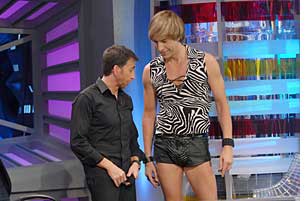 There
is no question that Cohen is a master at disappearing into his creation
and he is a very funny man. One crucial difference, between Bruno
and the screaming queens that we hated from the 70s, is that Bruno is not
a de-sexed nellie. He's even a top. Bruno is also confident in his sexuality
and not a self loathing queer. His decision to go straight later is fueled
by his obsession with becoming an accepted celebrity at the cost of his
identity. But the trouble with Bruno, however, is that the character is
so annoying and full of himself that it is impossible to ever like
him. Unlike, say, Christopher Guest's brilliantly lovable Corky St.
Clair in Waiting For
Guffmann, you are laughing at Bruno and not with
him. There
is no question that Cohen is a master at disappearing into his creation
and he is a very funny man. One crucial difference, between Bruno
and the screaming queens that we hated from the 70s, is that Bruno is not
a de-sexed nellie. He's even a top. Bruno is also confident in his sexuality
and not a self loathing queer. His decision to go straight later is fueled
by his obsession with becoming an accepted celebrity at the cost of his
identity. But the trouble with Bruno, however, is that the character is
so annoying and full of himself that it is impossible to ever like
him. Unlike, say, Christopher Guest's brilliantly lovable Corky St.
Clair in Waiting For
Guffmann, you are laughing at Bruno and not with
him. |
|
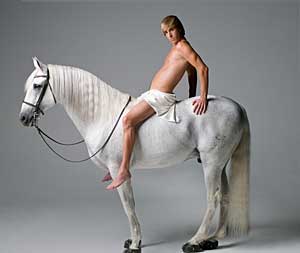 Attitudes
have changed a lot since I grew up during the 70s but do we want straight
red state America to see this? Presumably the humor is broad enough, and
so over the top, that no one could possibly think that Bruno represents
all gay men. Bruno makes
the homophobes who still cling to the dated stereotype look like fools and
hip audiences are laughing at them. It is obvious that Cohen gets
the joke himself, but it has been my experience that some people just don't
understand satire and there are enough over-the-top shenanigans on screen
that will undoubtedly feed into ingrained stereotypes. Do I think Bruno
is dangerous? No, but anything can be dangerous in the wrong
hands; look at how Charles Manson interpreted the lyrics on The Beatles'
White Album. Attitudes
have changed a lot since I grew up during the 70s but do we want straight
red state America to see this? Presumably the humor is broad enough, and
so over the top, that no one could possibly think that Bruno represents
all gay men. Bruno makes
the homophobes who still cling to the dated stereotype look like fools and
hip audiences are laughing at them. It is obvious that Cohen gets
the joke himself, but it has been my experience that some people just don't
understand satire and there are enough over-the-top shenanigans on screen
that will undoubtedly feed into ingrained stereotypes. Do I think Bruno
is dangerous? No, but anything can be dangerous in the wrong
hands; look at how Charles Manson interpreted the lyrics on The Beatles'
White Album. |
|
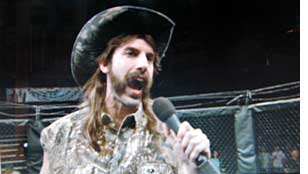 I
could climb up on a soapbox but I would be lying if I said that I didn't
laugh hysterically at a lot of Bruno.
Even so, I was disturbed by the climax. Bruno, in his efforts to become
straight, is now hosting Straight Dave's Man Slammin' Max-Out, a
homophobically fueled wrestling show. Reportedly, the audience of extras
hired for this scene was told they had tickets to an actual T&A wrestling
show and their reactions were unscripted. When Bruno and another man's grappling
in the wrestling cage turns into a kiss and then hot man on man sex, the
audience goes berserk. The sight of an angry mob throwing cups, bottles,
food and even chairs into the cage is actually quite chilling. Satire or
not, this scene walks a tightrope over a precipice. Dangerous? Maybe. Scary?
Yes. I
could climb up on a soapbox but I would be lying if I said that I didn't
laugh hysterically at a lot of Bruno.
Even so, I was disturbed by the climax. Bruno, in his efforts to become
straight, is now hosting Straight Dave's Man Slammin' Max-Out, a
homophobically fueled wrestling show. Reportedly, the audience of extras
hired for this scene was told they had tickets to an actual T&A wrestling
show and their reactions were unscripted. When Bruno and another man's grappling
in the wrestling cage turns into a kiss and then hot man on man sex, the
audience goes berserk. The sight of an angry mob throwing cups, bottles,
food and even chairs into the cage is actually quite chilling. Satire or
not, this scene walks a tightrope over a precipice. Dangerous? Maybe. Scary?
Yes. |
|
|
It's a sobering thought that Cohen's life might have actually been in danger during these stunts. Also consider the scenes where he is sashaying through the streets in the Middle East. I'm sure there were bodyguards off camera but I have to profess some admiration; this man has balls. But, again, will the targets of Cohen's satire get the joke? |
|
|
So, did I like Bruno? Well, I didn't love it but I certainly didn't hate it. Deep down the activist in me wants to abhor Bruno but I can't. This is a truly subversive film that is not cut from the same mold as the latest Adam Sandler comedy. The film makes a point and I hope that my fears are ungrounded and that everyone who sees it gets the joke. But, Mr. Cohen, please do us all a favor and make the star of your next film not gay, okay?
Sacha
Baron Cohen also appears in: |